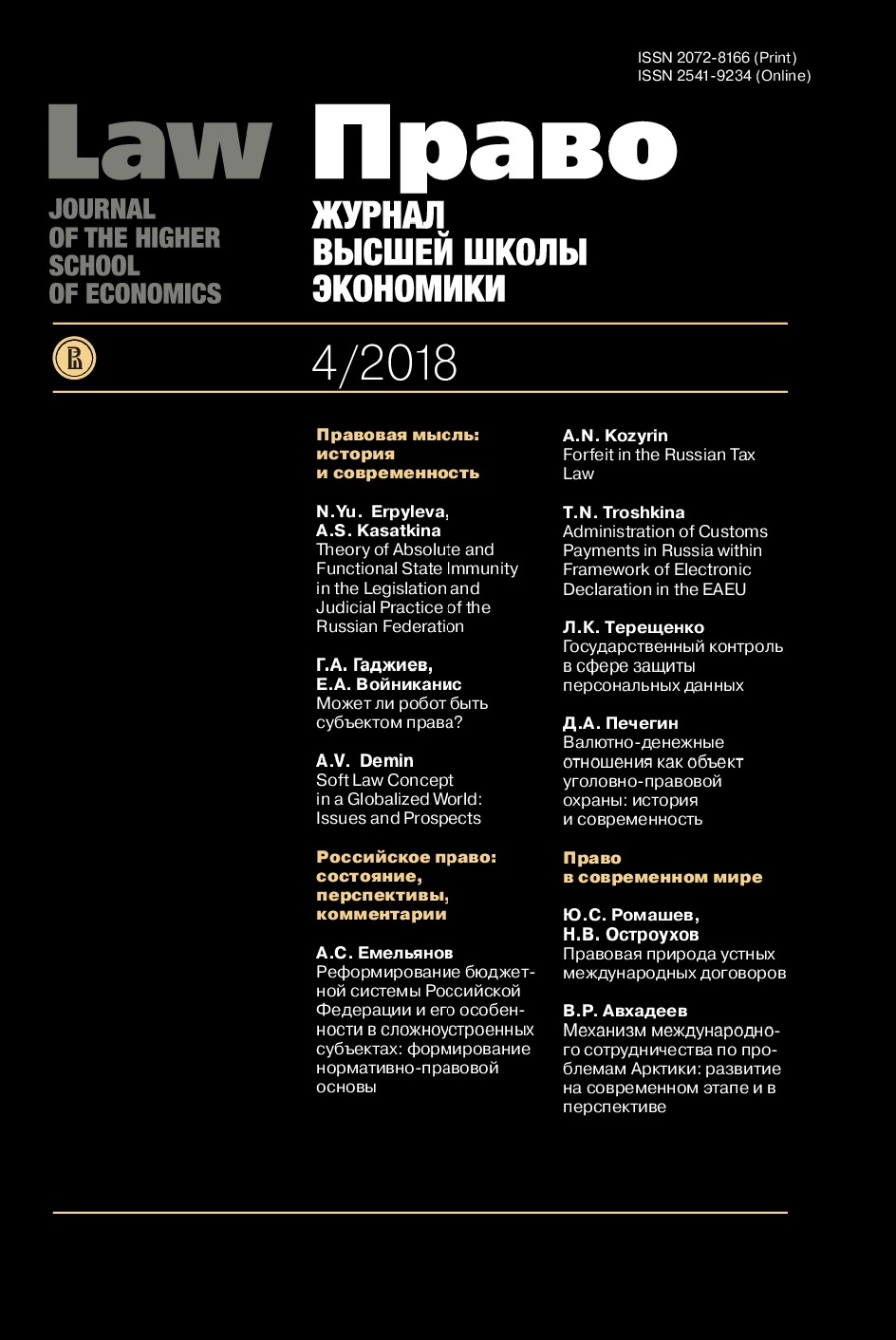Administration of Customs Payments in Russia within Framework of Electronic Declaration in the EAEU
Аннотация
On January 1, 2018, the Customs Code of the EAEU entered into force. Important developments are related to the fact that electronic declaration has now become an area of focus. This paper investigates impact of the application of this declaration form upon the efficiency of customs payments administration. For this purpose, the author conducted an analysis of the application of information and communication technologies in the activities of the customs authorities of the Russian Federation. It was justified that currently required level of organization of customs payments administration is not accomplished including due to the underdevelopment of the system for obtaining information on foreign trade prices, the lack of a systematic approach to the analysis of information on participants in foreign economic activities. The arguments are presented to confirm the conclusion that elimination of these obstacles is possible only with the use of progressive, innovative tools for administration of customs payments. The research substantiates the position that electronic declaration is the required instrument. For this purpose, a study in current application of the electronic declaration and the basis for its legal regulation in the Russian Federation was provided. The inherent positive aspects and identified unsolved problems were formulated and commented. It is indicated that modernization of information technologies, including for electronic declaration, is not new, but continues to fulfill the requirements of the action plan (“road map”) for improving customs administration. This statement is illustrated by the project on the administration of funds on the resource of the Unified Personal Accounts of the FC of Russia. The conclusion is substantiated that its application can be considered an effective tool for improving the of customs payments by simplifying calculations and reducing time of their implementation, as well as in connection with decrease of human factor influence. The position is argued that the mechanisms of the “single window” and electronic declaration are interrelated and the efficiency of the system of customs administration as a whole and customs payments as its component depends on their development. It was established the expectations from the application of electronic declaration, including on the improvement of the administration of customs payments, can be justified only under active convergence of national approaches among EAEU states in the implementation of information technology; for this purpose, an analysis of its legal framework at various levels was conducted: the legislation of the members of the EAEU, acts of supranational and international level of regulation. The results of the study can be applied not only in the Russia, but also in all EAEU members, where there is also no contemporary scholar basis for solving the issue under consideration.
Литература
Agaeva D.R., Anisimova E.D., Drobot E.V. (2016) Otsenka effektivnosti raboty tamozhennykh organov Rossiyskoy Federatsii: resultaty sotsiologicheskogo oprosa [Assessment of the effectiveness of the work of the customs authorities of the Russia: results of a sociological survey]. Economicheskie otnoshenia, no 6, pp. 3-11.
Aleksandrov D.L. (2012) Perspektivy razvitiya informatsionnykh tamozhennykh tekhnologiy: tekhnologia udalennogo vypuska tovarov [Prospects of development of information customs technologies: technology of remote release of goods]. Perspektivy razvitia informatsionnykh tekhnologiy, no 7, pp. 147-151.
Bakaeva O.Y. (2009) Pravovye aspekty tamozhennogo administrirovania: ponyatie i priznaki [Legal aspects of customs administration: concepts and signs]. Gosudarstvo i pravo, no 11, pp. 94-98.
Bondareva A.V. (2014) Vliyanie exportnoy tamozhennoy poshlilny na formirovanie dokhodov federalnogo byudzheta [The influence of the export customs duty on formation of federal budget revenues]. Gosudarstvo i obschestvo: vchera, segodnya, zavtra. Seria: Economika, no 2, pp. 133-141.
Chuvatova I.S. (2011) Voprosy sovershenstvovania deiatelnosti tamozhennuh organov po upravleniu tamozhennumi platezhami v Rossii: diss. ... kandidata ekonomicheskih nauk [On improving actions of customs bodies in sphere of customs payments in Russia. Candidate of Economics Thesis]. Moscow, 128 p.
Drobot E.V., Konovalova E.A. (2017) Sovershenstvovanie elektronnogo deklarirovania v tamozhennykh organakh Rossiyskoy Federatsii [Improvement of electronic declaration in the customs bodies of Russia]. Ekonomicheskie otnoshenia, no 2, pp. 143-158.
Kinyakin M.V. (2012) Tamozhennye organy kak institut integratsii Rossii v mirovyu ekonomiky: diss. ... kandidata juridicheskih nauk [Customs bodies as institute of Russia's integration into world economy: candidate of juridical sciences thesis]. Rostov, 214 p.
Kruss E.E. (2013) Administrativo-pravovaya deiatelnost' tanozhennuh organov v nalogovoi sfere: diss. ...kandidata juridicheskih nauk [Administrative activity of customs bodies in the tax sphere. Candidate of juridical sciences thesis]. Lyubertsy, p. 26.
Lobakhin D.V. (2013) Tekhnologia elektronnogo deklarirovania: problemy i perspektivy primenenia [Technology of electronic declaration: issues and prospects of application] Ekonomicheskie otnoshenia, no 2, pp. 51-55.
Lyalin N.M., Chernova L.G. (2014) Tekhnologii elektronnogo deklarirovania i udalennogo vypuska tovarov: nekotorye voprosy primenenia [Technologies of electronic declaring and remote release of goods: issues of application]. Logisticheskie sistemy v globalnoy ekonomike, no 4, pp. 413-417.
Soklakov A.A., Ostapchuk M.V. (2016) Mekhanizm pravovogo regulirovania tamozhennykh platezhey v usloviakh novoy formy ekonomicheskoy integratsii [Mechanism of legal regulation of administration of customs payments and a new form of economic integration] Simvol nauki, no 4, pp. 216-218.
Stamati E.P., Pavlikov I.A. (2016) Ispolzovanie tekhnologii udalennogo vypuska tovarov v rabote tamozhennykh organov [Using the technology of remote release of goods in the work of customs authorities] Ekonomicheskie otnoshenia, no 3, pp. 67-72.
Verish T.A. Problemy vzyimania tamozhennykh platezhey [Issues of collecting customs payments]. Problémy i perspektivy ekonomiki i menedzhmenta, no 12, pp. 248-251.
Vinnytsky D.V. (2014) Osnovnye voprosy kosvennogo nalogooblozhenia v Tamozhennom soyuze i perspektivy sovershenstvovania mekhanizmov nadnatsionalynoy sudebnoy zaschity [The main issues of indirect taxation in the Customs Union and the prospects for improving instruments of supranational judicial protection]. Rossiyskoe pravo, no 1, pp. 12-16.
Vorobyeva E.M. (2013) Peni v nalogovykh otnosheniyakh: doktrina i zakonodatelnoe regulirovanie [Forfeit in tax relations: doctrine and legal regulation]. Vestnik Permskogo universiteta: yuridicheskie nauki, no 4, pp. 68-81.
Copyright (c) 2018 Право. Журнал Высшей школы экономики

Это произведение доступно по лицензии Creative Commons «Attribution-ShareAlike» («Атрибуция — На тех же условиях») 4.0 Всемирная.


















